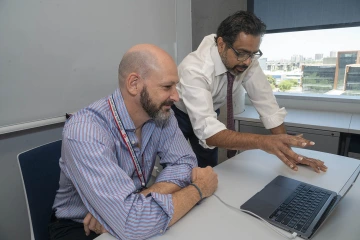Dr. Ayman Fanous Finds Music Among Tools to Explore the Mind
The College of Medicine – Phoenix’s new psychiatry chair sees great potential in research and music to provide precision solutions to aid mental health.

Ayman Fanous, MD, the new psychiatry chair at the UArizona College of Medicine – Phoenix, sees “precision psychiatry” as the wave of the future in behavioral health. Knowledge of an individual’s genetic makeup will allow us to develop safer and more effective treatment plans, he says.
Musicians John Coltrane and Ornette Coleman are free-form jazz legends, but an Egyptian-born psychiatrist at the University of Arizona College of Medicine – Phoenix may be laying his own claim to the genre.

Dr. Fanous has several albums to his name and considers music a “second career.” In addition to free-form jazz guitar work, he plays the bouzouki, a long-necked lute from Greece.
Free-form jazz and psychiatry aren’t often mentioned in the same sentence, but Ayman Fanous, MD, plays both the guitar and bouzouki, a long-necked stringed instrument popular in the eastern Mediterranean of his roots. Last July, he performed at American University’s Tahrir Cultural Center in his native Cairo. His performance pulled from his latest CD, Negoum. The 2019 album, with cellist Frances-Marie Uitti, offers a more regional free-form sound in contrast to jazz fusion he played with New York artists including William Parker, Joe McPhee and Elliott Sharp.
On his most recent recording, Dr. Fanous’ free-form string work almost resembles an atonal audio Rorschach test. “Lubricity,” a solo effort on the album I Never Meta Guitar 5, explores melodies in a distinctly nonlinear fashion that acts like a psychotropic key to open up the mind’s latent capabilities.
That’s rather apropos considering Dr. Fanous is a psychiatrist. He was recruited last fall from the State University of New York to chair the Department of Psychiatry at the College of Medicine – Phoenix.
Egypt, Utah and the East Coast
Growing up primarily on the East Coast, Dr. Fanous graduated from West Potomac High School, then went to the University of Virginia for his undergraduate work. He attended Virginia Commonwealth University (VCU) for his medical degree. His path into medicine followed in the footsteps of his father, who was a urologist.

The improvisational stylings of free-form jazz can sometimes sound discordant, raucous and blaring in a group setting, but Dr. Fanous’ music is often melodic as he weaves in and out of different rhythmic cadences.
And, due to his own interest in philosophy and psychology, psychiatry and healing the mind-body nexus were a “perfect fit” for him.
At VCU, he was inspired by Kenneth Kendler, MD, a pioneer in research on psychiatric genetics and related causes of schizophrenia, who became his mentor. After residency training at New York University, with clinical rotations at Bellevue Hospital, the Manhattan Psychiatric Center and New York VA Medical Center, Dr. Fanous returned to VCU for post-doctoral research.
Precision psychiatry
Schizophrenia, characterized by persistent delusions, hallucinations, and disordered speech and thinking that impairs daily function, affects about 1 in 300 people, or 24 million globally, according to the World Health Organization. In the U.S., as many as 2.8 million people suffer from the condition, with up to 40% untreated in any given year.
“It leads to all kinds of disruptions, not just in terms of lost productivity, but also an inability to hold down jobs and maintain relationships. And the suicide rate has just been out of control. We’re talking about one of the largest public health problems,” Dr. Fanous said.

Dr. Fanous collaborates with physician-scientists at universities around the world to tap into large databases, including the VA’s Million Veteran Program. The research offers hope, he says, of finding more precise approaches to diseases of the mind.
“Up until the ’90s, we knew hardly anything about the genetics of schizophrenia. We knew the illness was familial – that some illnesses ran in families. But we didn’t have the technology then to really dig into the genome. That took a while. You could see it coming, though.”
The Human Genome Project in 2003 led to the U.S. Department of Veterans Affairs’ Million Veteran Program in 2011 and National Institutes of Health’s All of Us Research Program in 2015. Both programs seek to amass genetic databases of 1 million or more people to accelerate research for precision medicine therapies.
Tapping into that and similar data, Dr. Fanous focused his career on psychiatric genetics and psychopharmacology, which lead to posts as associate professor at Georgetown University and chief of the Psychiatric Genetics Research Program at the Washington DC VA Medical Center.
In 2016, he landed at SUNY Downstate Health Sciences University as psychiatry chair and associate director of the Institute for Genomic Health, where the Genomic Psychiatry Cohort database of 40,000 individuals allowed for large-scale genomic studies.
Building on a dream
Dr. Fanous called his position at the College of Medicine – Phoenix his dream job. He was impressed by college leadership, resources, energy and alignment toward precision medicine – as well as city and state support for building a biomedical research hub.
“I realized this was a chance in a lifetime to start a research program or department from the ground up,” he said. “It also seemed that there was a lot of potential energy and resources that could go into developing an area of psychiatry very near and dear to my heart, precision psychiatry, that I didn’t have at my other institution. The alignment here was perfect.”
He was attracted to the opportunity to continue collaborating with the Million Veterans Program through the VA Phoenix Health Care System and potentially work with the UArizona – Banner Health All of Us Research Program, Translational Genomics Research Institute and Banner Alzheimer’s Institute.
Today, his most recent research highlights a key advance in understanding schizophrenia as coauthor of a paper, published in the journal Nature, that represented the largest ever genetic study of the disorder. Using data from the Psychiatric Genomics Consortium, researchers analyzed DNA from 76,755 people with schizophrenia and 243,649 without it and identified nearly 300 genomic regions and 120 specific genes tied to the illness.
“That was a watershed moment,” Dr. Fanous said. “We’re at the stage that we’re now able for the very first time to identify some of the biological pathways leading to schizophrenia, based on our understanding of the genetics. It’s a really exciting time.”
DNA grooves
Dr. Fanous even thinks about genetics in his music, which he considers a “second career.” A jazz track on his 2013 album, Zilzal, with violinist Jason Kao Hwang, is entitled “DNA: Binding Sights.”
While he hasn’t yet played publicly in Phoenix, he is exploring the city’s many jazz clubs, from The Nash to the Rhythm Room. A robust jazz scene, he admitted, also enticed him to the College of Medicine – Phoenix.
“I will be playing here,” he promised. “Once I get set up, yes, I for sure will be.”

